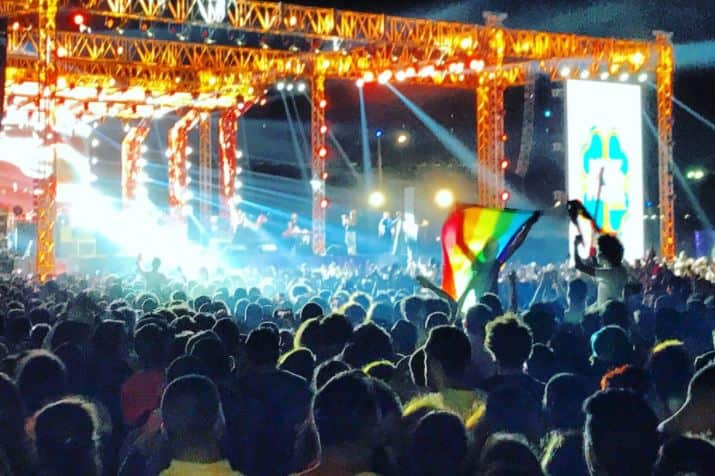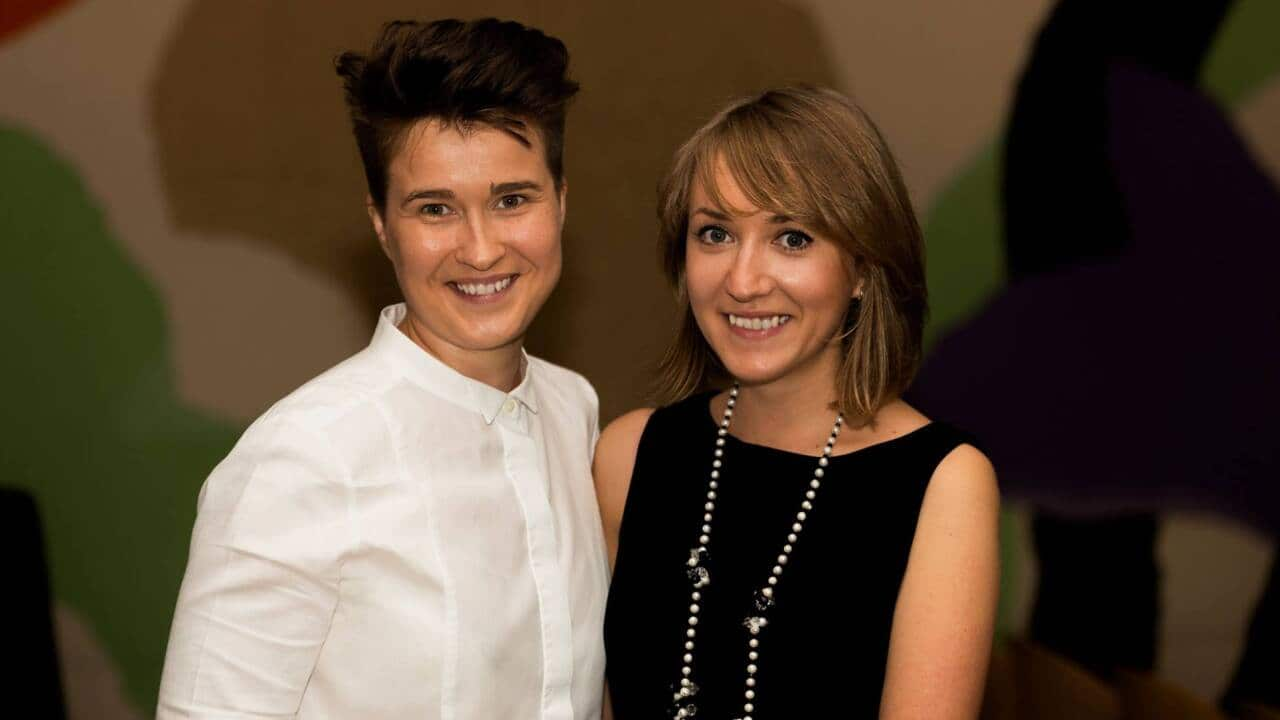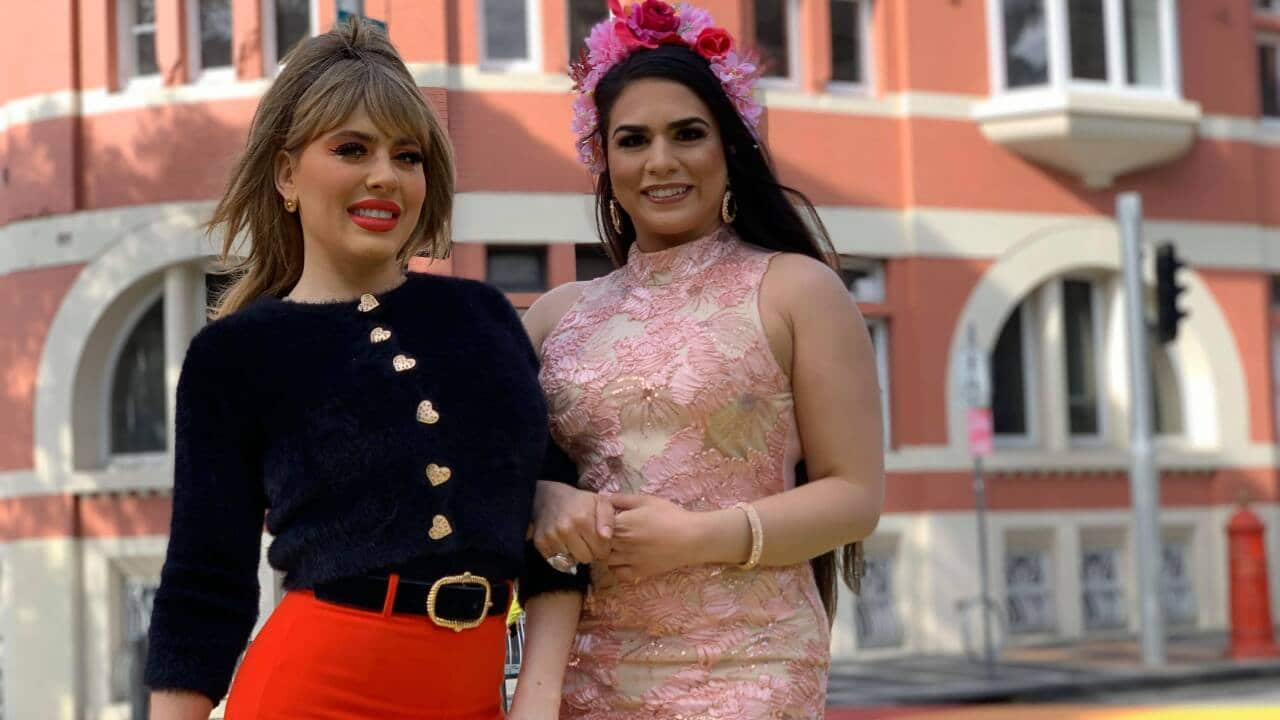Content warning: contains reference to suicide.
Ahmed Alaa was imprisoned for flying the rainbow flag in Egypt

Ahmed Alaa says the day after the concert, the social media post "had a lot of comments and shares, there were people threatening me and saying they’d kill me." Source: Supplied
“It’s something I’ve wanted to do since I was a kid,” the 25-year-old tells SBS News. “It’s a way of escaping, just being in the ocean."
It’s a sense of freedom that Ahmed longs for, something he last felt in September 2017 when he raised the rainbow flag - a symbol of LGBTIQ+ pride - at a rock concert in his home city of Cairo, Egypt's capital.
He was watching the Lebanese band Mashrou’ Leila, whose lead singer is openly gay and performs songs in support of sexual and gender diversity.
Ahmed identifies as pansexual - people who are romantically and sexually attracted to others regardless of their sex and gender identity. Pansexual people are represented, among others, by the + in LGBTIQ+.
Ahmed says he felt proud as he sat on the shoulders of a friend, flying the rainbow flag above the 35,000-strong crowd. “Even heterosexual people cannot kiss [in public] in Egypt … but at this concert, people came to hear music and to dance and to love,” he says. “It was the best moment of my life, it was the biggest thing I have ever done."
“Even heterosexual people cannot kiss [in public] in Egypt … but at this concert, people came to hear music and to dance and to love,” he says. “It was the best moment of my life, it was the biggest thing I have ever done."

Ahmed Alaa raises the rainbow flag at a concert in Cairo in 2017. Source: Supplied
But it carried grave consequences.
In many parts of the Middle East, it is still illegal to be gay, and although homosexuality is not explicitly criminalised in Egyptian law, police and national security arbitrarily arrest members of the LGBTIQ+ community.
Under the leadership of President Abdel Fattah al-Sisi, some officials equate homosexuality with terrorism, leading to random arrests based on a person’s sexual orientation or expression of gender.
Photos of Ahmed at the concert were shared widely on social media and 10 days after the concert a group of men arrested Ahmed in the street. It was his 21st birthday. “I was sent to a police station and they told me I was going to national security ... the worst nightmare in Egypt," he says. “People get tortured there and people get killed. People get arrested without even their family knowing.”
“I was sent to a police station and they told me I was going to national security ... the worst nightmare in Egypt," he says. “People get tortured there and people get killed. People get arrested without even their family knowing.”

Ahmed Alaa at a demonstration. He now lives in Canada. Source: Supplied
Ahmed says he was questioned for eight hours without a lawyer and accused of joining banned groups and promoting debauchery.
“They kept asking me, ‘[would you be] you okay if your son is gay or if your sister is a lesbian?’”
Officers shaved off his long, curly hair.
“In Egypt, if you have long hair [people assume] you are gay and when you are gay, we can do whatever we want with you,” he says.
And he spent almost 80 days in solitary confinement.
“It was so scary. All the people around me had all killed people or were terrorists.”
“One of the police officers told the prisoners that the guy in solitary confinement, the new guy, is the gay person from the concert. They started threatening me, saying that they were going to rape me or kill me.”
Nabil fled to Australia after his same-sex relationship was exposed by Saudi authorities
Nabil (not his real name) shares his story on the condition of anonymity.
“In Saudi Arabia, I had a very good life ... I had a very high-powered job, I had a house, a couple of cars - and I also had my partner,” he says.
“We’d been together secretly for 18 years and we’d often had to move houses so that our neighbours didn’t start asking questions.”
In Saudi Arabia, same-sex relationships are illegal and can be punishable with the death penalty.
“To mask their identity people act as straight as possible, you keep it quiet, you keep it in the shadows,” he says.
He met his partner online he says it was a risk meeting up for the first time.
“You hear about setups, sting operations that happen ... Your family name carries a lot of weight and if you were to shame your name then it would rebound on your family.
“We have had cases of honour killings in Saudi Arabia where a family finds out their kid is gay and then suddenly, you’ll be killed and you’ll be made to disappear.”
Authorities found out about Nabil's relationship and police asked him and his partner to present at a prison.
“What had preceded were a bunch of threats from my partner’s family … actively looking for me, trying to get me killed," Nabil says. "Better to kill me than kill their own."
They had no choice but to flee.
“We boarded a flight overnight, we left everything behind - house, cars ..."
They spent time trying to get to Canada but eventually came to Australia. After a period in detention, they were granted visas and released.
“I sleep much better here. I’m not worried that someone is going to kick in the door in the middle of the night and haul us off to prison,” Nabil says.
“We’ve starting to hold hands in public."
'These people are extremely vulnerable'
Director of Human Rights Watch Australia Elaine Pearson, says stories like Ahmed's and Nabil's are not uncommon.
“These stigmas exist in part because of a particular interpretation of Sharia Law … which criminalises same-sex conduct [as well as] a number of colonial legacy laws.”
“LGBTIQ+ people are extremely vulnerable in Middle Eastern countries and many people take extreme lengths to hide that part of their identity for their own protection.
“[They face] discrimination, even being swept off the streets based on the way they look, subjected to forced anal exams in some countries, subjected to arbitrary arrests and detention and sometimes violence by state and non-state actors.”
But while some escape, the impacts of what some LGBTIQ+ people have experienced in their home countries remains.
Ahmed’s detainment was part of the Egyptian government’s largest crackdown on the LGBTIQ+ community and resulted in 75 other arrests. One of those arrested alongside Ahmed was his close friend Sarah Hegazy.
The pair carried the most serious charges in the group and both endured human rights abuses while in custody before being released on bail.
Instead of awaiting a trial that could have landed them in prison for 15 years, they fled to Canada and sought asylum. Now living in Ontario, Ahmed is studying marine navigation at university.
Sarah took her own life while in exile in Canada last year. “She was a quiet person … she was super communist and super lesbian, she kept telling me that,” Ahmed says with a smile.
“She was a quiet person … she was super communist and super lesbian, she kept telling me that,” Ahmed says with a smile.

Sarah Hegazy flying the Pride flag at the Mashrou’ Leila concert in Cairo. Source: Twitter
“She went to the concert, to express herself, to raise the flag … to tell everyone to express themselves freely.”
“I wish someday people can express themselves as freely as they want, without being scared of being tortured, arrested or killed just for being different, just for loving someone.”
Ahmed Alaa will take part in the event on 27 February as part of the 2021 Sydney Gay and Lesbian Mardi Gras. It aims to share stories of resistance resilience when it comes to LGBTIQ+ rights in the Arab World.
The Mardi Gras parade will be broadcast live at 6pm AEDT on Saturday 6 March on SBS On Demand or catch the full parade at 7:30pm on SBS and NITV. Follow the conversation on social media with the hashtag #MardiGras2021 and visit for more stories.
Readers seeking support can contact Lifeline crisis support on 13 11 14, Suicide Call Back Service on 1300 659 467 and Kids Helpline on 1800 55 1800 (for young people aged 5 to 25). More information is available at and . supports people from culturally and linguistically diverse backgrounds.
LGBTIQ+ Australians seeking support with mental health can contact QLife on 1800 184 527 or visit . also has a list of support services.
***
Here's where else you can find SBS News content and follow us:
SBS also publishes news in 68 languages online and on radio. Find your language at .




